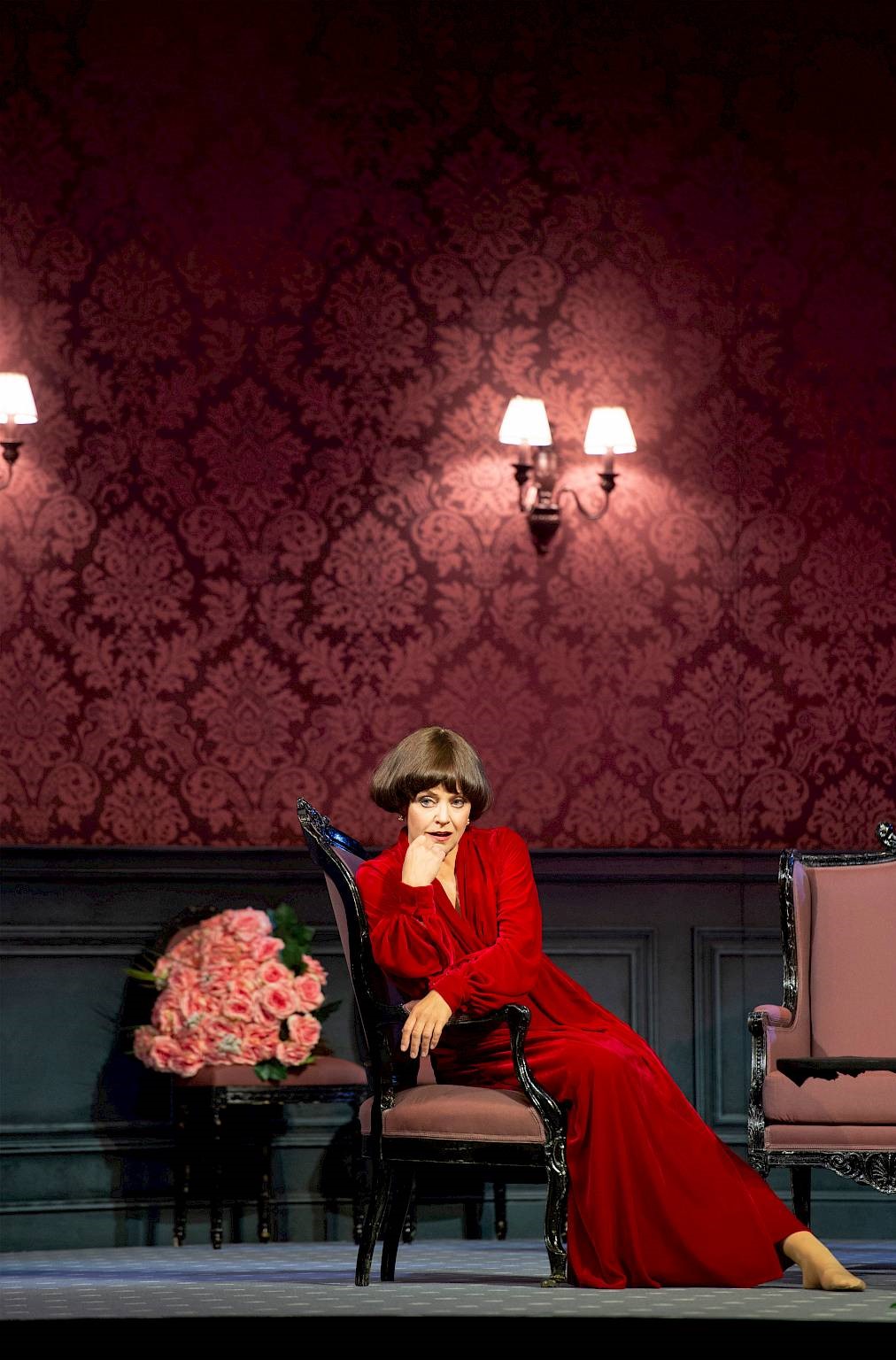 Switzerland Janáček, The Makropulos Affair: Soloists, Chorus of Zurich Opera, Philharmonia Zurich / Jakub Hrůša (conductor), Zurich Opera, Zurich 22.9.2019. (JR)
Switzerland Janáček, The Makropulos Affair: Soloists, Chorus of Zurich Opera, Philharmonia Zurich / Jakub Hrůša (conductor), Zurich Opera, Zurich 22.9.2019. (JR)

Production:
Staging and Set design – Dmitri Tcherniakov
Costumes – Elena Zaytseva
Lighting designer – Gleb Filshtinsky
Video designer – Tieni Burkhalter
Chorus master – Ernst Raffelsberger
Dramaturgy – Beate Breidenbach
Cast:
Emilia Marty – Evelyn Herlitzius
Albert Gregor – Sam Furness
Vítek -Kevin Conners
Krista – Deniz Uzun
Baron Jaroslav Prus – Scott Hendricks
Janek Prus – Spencer Lang
Dr. Kolenatý -Tómas Tómasson
Stage technician – Ruben Drole
Cleaning woman -Irène Friedli
Count Hauk-Schendorf -Guy de Mey
Chambermaid – Katia Ledoux
The Makropulos Affair (sometimes known as The Makropulos Case) was the result of Janáček seeing, in Prague in 1922, a new play with virtually the same title, by one Karel Čapek; the play exposed the age-old quest for eternal life as a pointless exercise. Janáček immediately saw the plot as potential material for an opera.
The opera has little in common with either the searing intensity of Janáček’s best-known operas Jenůfa or Káťa Kabanová, or the melodic charm of The Cunning Little Vixen. Instead, it presents the listener for the most part with a series of motifs; we are, however, undoubtedly in Janáček’s unique and mesmerising sound world. Only at the end of the final act does the music develop lyrically. The overture promises more than the opera delivers, and it remains one of Janáček’s more rarely performed works. Although composed in 1925, it did not become widely known until Sir Charles Mackerras performed it in London back in 1964; but it has still not become part of the core opera repertory. The Met introduced New York audiences to the opera as late as in 1996, and then in English.
The ridiculous plot does not help the opera’s cause.
Lawyers dream of the fees in cases that they might drag out for a hundred years; and a few people dream of living to a great age or even living forever, as long as they can stay (relatively) young and attractive. Both dreams come true for the lawyer and the chief protagonist in this opera.
We are in Prague, in the 1920s. A contentious probate case has been rumbling on for nearly a century. The lawyer Dr. Kolenatý acts for the middle-class but debt-ridden Gregor family against the wealthier and aristocratic Prus family. The decision in the case is expected imminently. Kolenatý returns from court in Act I with Emilia Marty, a cold-hearted but beautiful singer. He talks about the case in which Baron Joseph Ferdinand Prus had died, in 1827, apparently leaving neither a will nor any legitimate children, so his cousin claimed the estate; but so also did Ferdinand Gregor, who claimed the Baron had promised the estate to him. Emilia seems to know about the history and claims that Ferdinand Gregor was the illegitimate son of Baron Joseph and an opera singer, one Ellian MacGregor. She also seems to know where to find the original will – in an old cupboard at the Prus mansion; she wants it (but does not reveal this at this early stage of the opera) because attached to it is a formula for a potion, an elixir of life; and she needs that to further extend her own life. After some twists and turns, Emilia tells the truth and solves the mystery of her identity. She is in fact Elina Makropulos, daughter of Hieronymus Makropulos, an alchemist at Emperor Rudolf II’s Court, who ordered her father to prepare a potion that would extend the Emperor’s life. When the potion was ready, the Emperor ordered that the alchemist test it on his daughter first, which he duly did. She fell into a coma, apparently fatal; her father was sent to prison. However, Elina woke and fled with the formula. She has lived for three centuries (she now claims to be 337 years old) and has become, handily for the opera, one of the best singers of all time. To conceal her longevity, she has adopted many identities, but always used the initials E.M. Having now told her story and revealed her identity and affair (as Ellian MacGregor) with Baron Joseph, the potion finally wears off; the will (and formula for the potion) is found but, aging rapidly, she realises endless life is futile, lonely and boring, and collapses. Ferdinand Gregor, having obtained the will, wins the case and inherits the estate.
It’s unlikely material for an opera, but Janáček, approaching 70, was in love with a married woman less than half his age at the time; he wrote her hundreds of passionate letters. How he must have wished for an elixir of youth.
Producer Dmitri Tcherniakov places what little actual action there is into a room which doubles as the lawyer’s waiting room and a room at the theatre or opera. Furnishings, costumes and wallpaper indicate the 1920s. Tcherniakov deals with the question of life and death during the overture, with video projections of medical X-rays, a written medical prognosis of terminal cancer, and a to-do-list of the person who has been told that he/she will soon die. He takes that theme no further in the opera itself. The coup de théâtre, however, comes at two points at the very end of the opera: the scenery is lifted to reveal an audience (including a small chorus) watching a play, presumably the play by Karel Čapek; we had an inkling of what might come when seeing characters, who were not on stage, in the wings awaiting their entrance. Then, however, the singer in the role of Emilia Marty actually dies, a medic rushes on. A clever production, very well received.
Evelyn Herlitzius clearly enjoys the role of Emilia Marty and it fits her vocal range, especially the declamatory side of the role. Although I was not entirely convinced, she captured Emilia’s coldness. Young Welsh tenor Sam Furness is a promising talent but he has difficulty with the top notes in this score and is a little under-powered. American tenor Kevin Conners as the lawyer’s clerk Vitek, the lawyer himself, Icelandic baritone Tómas Tómasson, and American baritone Scott Hendricks as Jaroslav Prus are all first-rate singers who projected their voices very well. Deniz Uzun as Vitek’s daughter makes a strong impression. Guy de Mey was solid as the lunatic Hauk-Schendorf, but attention is grabbed by his electrified wheelchair, gaudy Spanish costume and glittering earrings, the costume designer neatly introducing a touch of vaudeville into the farcical element of the opera.
Given the composer’s characteristic attention to the rhythms of language, it is a pity none of the singers are Czech. They cope with the language at different levels of success.
Zurich Opera was fortunate to secure a conductor steeped in Janáček; Jakub Hrůša was born in Brno and has conducted Makropulos in Vienna. He is Principal Guest Conductor of the Czech Philharmonic (and the Philharmonia). The overture was taut and pulsating, and there was much insightful highlighting throughout the opera. Hrůša almost (but only almost) made the case that this is an opera that deserves more frequent appearances. It did, however, make a fine start to Zurich’s new season. The opera needs fine singers and a fine production, and here it got both.
Congratulations by the way to Zurich Opera for receiving the ‘Best Opera House’ award from ‘Oper! Awards’. This is the first time these awards have been given by a nascent competitor to the International Opera Awards. I cannot help noticing that the jury are entirely German, so their impartiality outside the German-speaking world remains to be seen.
John Rhodes
